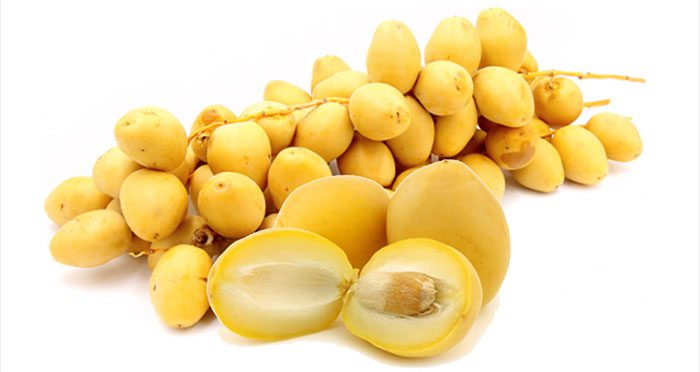What are the benefits of dried dates?
Health Benefits of Dates
Health Benefits of Dates
Dates originate from Africa, Southeast Europe (Crete), and Southern Asia (from Turkey to Southern China and Malaysia).

Dates belong to the Phoenix genus originating from the regions around the Persian Gulf
There are many types of dates: Canary dates, Medjool dates, Senegal dates, dwarf dates, Cliff dates, Indian dates, and Tunisian dates.
Belonging to the Phoenix genus, dates have been a staple food in the Middle East and the Indus Valley for thousands of years. Ancient Egyptians used dates to make wine and food.
According to Dr. Huỳnh Tấn Vũ, a specialist at Ho Chi Minh City University of Medicine and Pharmacy (Campus 3), dates are considered a nutritious snack. Dates are a rich source of iron, helping to build blood. Additionally, dates promote cardiovascular health, improve digestion, and protect bones…
Traditional Middle Eastern medicine uses various parts of the date palm to treat many diseases. Young dates help women increase their fertility. In Saudi Arabia, people use dates as a fertility-supporting food.
Rich in potassium, glycine, and threonine, dates activate the prolactin hormone that promotes milk production. Therefore, they can enhance milk production for postpartum mothers.
Middle Eastern and North African residents also use dates as a natural remedy to treat ailments such as sore throats and colds.

What are the benefits of dried dates is a concern for many. (Photo: VTC News).
Not only rich in natural fiber, dates are also a source of vitamins A, B, K, trace minerals, and fats.
Scientists in the UK have announced that eating dates daily is essential for a balanced and healthy diet.
Heart-Friendly
Dried dates are low in fat and contain negligible cholesterol. Furthermore, they are well-known for their ability to control “bad” LDL cholesterol levels in the blood. Dates are also low in sodium but high in potassium, which helps regulate blood pressure.
Improves Digestion
Dried dates possess antioxidant properties that promote metabolic processes, thereby supporting weight loss. Additionally, they are rich in fiber, which enhances digestive fluid secretion and increases food absorption.
Reduces Constipation
One of the most common benefits of eating dried dates is reducing constipation. There are many reasons for constipation, including a lack of fiber in the diet. Dates are high in fiber, making them a natural laxative.
Boosts Bone Health
Dried dates are an excellent source of calcium, which is beneficial for bones and teeth. A small amount of dried dates can be a good option to prevent calcium deficiency, which can lead to osteoporosis, arthritis, and dental problems.

Dates – (Photo: ST).
Promotes Amino Acid Production
Consuming dates provides pregnant women with essential proteins. This nutrient plays a crucial role in producing amino acids necessary for the baby’s development and meeting the mother’s active needs.
Provides Vitamin K for Fetuses
Consuming dates during pregnancy and after childbirth will provide a significant amount of vitamin K for the baby. This vitamin plays a crucial role in supporting blood clotting and bone development in young children.
Good for Skin
Dried dates are a source of vitamin B5, which is particularly beneficial for skin cells and helps repair damage caused by free radicals. The presence of antioxidants helps achieve youthful skin. Additionally, it nourishes the skin and improves its surface.
Reduces Blood Pressure
The potassium and magnesium in dates help lower blood pressure.
Treats Anemia
Dates are rich in iron, vitamin C, and vitamin B6. Eating dates daily helps produce hemoglobin, thus preventing anemia.
Moreover, dates are also a great remedy for alcohol toxicity, combat cell damage, prevent pancreatic cancer, and mitigate strokes and heart disease. Instead of eating fried foods or high-calorie snacks, you should opt for dates.

Dates are a great remedy for alcohol toxicity.
Helps Lower Blood Sugar
Dates are beneficial for diabetics due to their low glycemic index (GI). Researchers at Tabuk University (Saudi Arabia) analyzed over 900 studies on dates. Among them, 400 adults with diabetes consumed dates from one day to 12 weeks. The results showed a decrease in fasting and post-meal blood sugar levels. 13 phenolic compounds in this fruit at high levels inhibit enzymes that break down carbohydrates into glucose (sugar).
According to researchers, dates also contain non-nutritive phytochemicals with biological activity such as carotenoids, polyphenols, phenolic acids, and flavonoids. They act like powerful antioxidants, helping to lower blood sugar, reduce inflammation, and have the potential to combat diabetes. The high fiber and phenol content also contributes to preventing chronic diseases such as cardiovascular issues, atherosclerosis, and hypertension.
The American Diabetes Association recommends that dates can replace other sweeteners in a diet in moderate amounts.
While dates are healthy, it is important to be cautious when consuming them. The sugar content in dried dates is high, so people with diabetes should avoid them. Dates also contain tyramine, which can cause migraines in some individuals if consumed in large amounts, so it is best to eat only 3 to 5 dates at a time.
Helps Lower Cholesterol
This fruit can help regulate cholesterol levels and promote weight loss. Obesity is a common health issue among type 2 diabetes patients, and if body weight is not controlled, you risk facing various other health issues that can exacerbate the current condition.
Boosts Energy
Feeling fatigued and need a quick energy boost? Dates can be a healthy natural option for you.
They contain natural sugars such as sucrose, glucose, and fructose. Therefore, this fruit is an excellent snack idea for those who have just worked out or come from a training session. In fact, these fruits are even used worldwide to help avoid fatigue.



















































